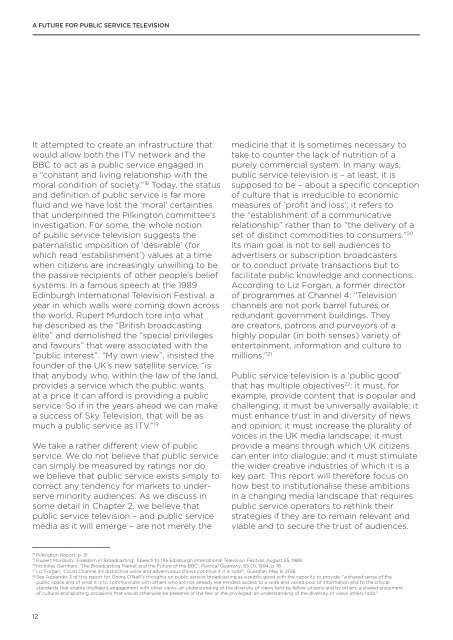A FUTURE FOR PUBLIC SERVICE TELEVISION CONTENT AND PLATFORMS IN A DIGITAL WORLD
FOTV-Report-Online-SP
FOTV-Report-Online-SP
You also want an ePaper? Increase the reach of your titles
YUMPU automatically turns print PDFs into web optimized ePapers that Google loves.
A <strong>FUTURE</strong> <strong>FOR</strong> <strong>PUBLIC</strong> <strong>SERVICE</strong> <strong>TELEVISION</strong><br />
It attempted to create an infrastructure that<br />
would allow both the ITV network and the<br />
BBC to act as a public service engaged in<br />
a “constant and living relationship with the<br />
moral condition of society.” 18 Today, the status<br />
and definition of public service is far more<br />
fluid and we have lost the ‘moral’ certainties<br />
that underpinned the Pilkington committee’s<br />
investigation. For some, the whole notion<br />
of public service television suggests the<br />
paternalistic imposition of ‘desirable’ (for<br />
which read ‘establishment’) values at a time<br />
when citizens are increasingly unwilling to be<br />
the passive recipients of other people’s belief<br />
systems. In a famous speech at the 1989<br />
Edinburgh International Television Festival, a<br />
year in which walls were coming down across<br />
the world, Rupert Murdoch tore into what<br />
he described as the “British broadcasting<br />
elite” and demolished the “special privileges<br />
and favours” that were associated with the<br />
“public interest”. “My own view”, insisted the<br />
founder of the UK’s new satellite service, “is<br />
that anybody who, within the law of the land,<br />
provides a service which the public wants<br />
at a price it can afford is providing a public<br />
service. So if in the years ahead we can make<br />
a success of Sky Television, that will be as<br />
much a public service as ITV.” 19<br />
We take a rather different view of public<br />
service. We do not believe that public service<br />
can simply be measured by ratings nor do<br />
we believe that public service exists simply to<br />
correct any tendency for markets to underserve<br />
minority audiences. As we discuss in<br />
some detail in Chapter 2, we believe that<br />
public service television – and public service<br />
media as it will emerge – are not merely the<br />
medicine that it is sometimes necessary to<br />
take to counter the lack of nutrition of a<br />
purely commercial system. In many ways,<br />
public service television is – at least, it is<br />
supposed to be – about a specific conception<br />
of culture that is irreducible to economic<br />
measures of ‘profit and loss’; it refers to<br />
the “establishment of a communicative<br />
relationship” rather than to “the delivery of a<br />
set of distinct commodities to consumers.” 20<br />
Its main goal is not to sell audiences to<br />
advertisers or subscription broadcasters<br />
or to conduct private transactions but to<br />
facilitate public knowledge and connections.<br />
According to Liz Forgan, a former director<br />
of programmes at Channel 4: “Television<br />
channels are not pork barrel futures or<br />
redundant government buildings. They<br />
are creators, patrons and purveyors of a<br />
highly popular (in both senses) variety of<br />
entertainment, information and culture to<br />
millions.” 21<br />
Public service television is a ‘public good’<br />
that has multiple objectives 22 : it must, for<br />
example, provide content that is popular and<br />
challenging; it must be universally available; it<br />
must enhance trust in and diversity of news<br />
and opinion; it must increase the plurality of<br />
voices in the UK media landscape; it must<br />
provide a means through which UK citizens<br />
can enter into dialogue; and it must stimulate<br />
the wider creative industries of which it is a<br />
key part. This report will therefore focus on<br />
how best to institutionalise these ambitions<br />
in a changing media landscape that requires<br />
public service operators to rethink their<br />
strategies if they are to remain relevant and<br />
viable and to secure the trust of audiences.<br />
18<br />
Pilkington Report, p. 31.<br />
19<br />
Rupert Murdoch, ‘Freedom in Broadcasting’, Speech to the Edinburgh International Television Fesitval, August 25, 1989.<br />
20<br />
Nicholas Garnham, ‘The Broadcasting Market and the Future of the BBC’, Political Quarterly, 65 (1), 1994, p. 18.<br />
21<br />
Liz Forgan, ‘Could Channel 4’s distinctive voice and adventurous shows continue if it is sold?’, Guardian, May 8, 2016.<br />
22<br />
See Appendix 3 of this report for Onora O’Neill’s thoughts on public service broadcasting as a public good with the capacity to provide: “a shared sense of the<br />
public space and of what it is to communicate with others who are not already like minded; access to a wide and varied pool of information and to the critical<br />
standards that enable intelligent engagement with other views; an understanding of the diversity of views held by fellow citizens and by others; a shared enjoyment<br />
of cultural and sporting occasions that would otherwise be preserve of the few or the privileged; an understanding of the diversity of views others hold.”<br />
12


